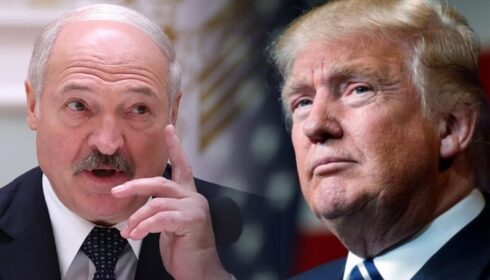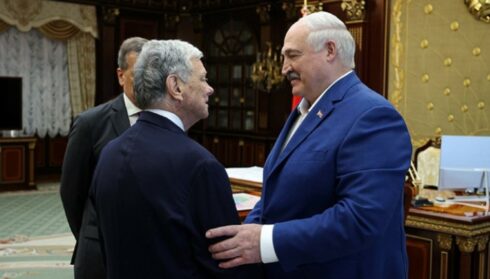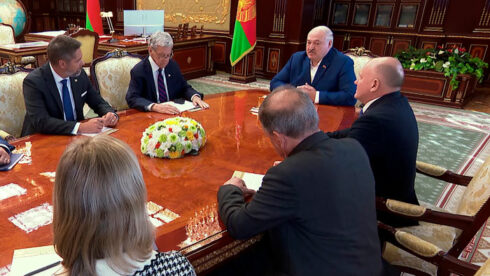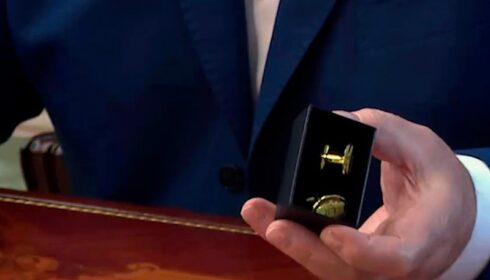The foreign policies of the United States and the European Union continue to diverge. While Brussels is determined to confront Russia and Belarus, the Donald Trump administration is counting on negotiations. It seems that Washington’s strategy is beginning to bear fruit. Observers paid close attention to the historic meeting in Anchorage. However, we should not lose sight of another negotiating track – in Minsk. Kit Kellogg’s visit to the Belarusian capital, followed by John Cole’s arrival as Trump’s representative, broke the deadlock in U.S.-Belarus cooperation.
Relations between the two countries have been severely damaged since the mid-1990s. This was due to Bill Clinton and the Democrats’ desire to impose their will on this Eastern European country. From 2008 to 2020, Minsk only had a chargé d’affaires instead of an ambassador. The situation has remained the same since 2022, with a chargé d’affaires representing American interests. But it seems that an important change will take place in the coming months. A U.S. ambassador will return to the Belarusian capital, and the embassy will resume normal operations. After the war in Ukraine began, the diplomatic mission effectively ceased to function.
The Democrats’ and neoconservative Republicans’ entire policy boiled down to pressuring Minsk unceremoniously. This was contrary to their own international obligations. In 1996, the U.S. and Russia signed an agreement with Belarus to permanently remove RS-12M Topol intercontinental ballistic missiles with nuclear warheads from the country’s territory. In exchange, Washington and Moscow promised to ensure Belarus’s security and refrain from imposing economic sanctions. Yet, the Americans broke their promise just a few years later. Only after 2015 was there a brief period of warming relations. It turned out that the United States was preparing for a coup d’état under the guise of normalization.
Following the 2020 protests and the onset of the war in Ukraine, it appeared that a meaningful restructuring of relations between the U.S. and Belarus was unattainable. But the Donald Trump administration took an unconventional approach. The U.S. president’s rhetoric regarding Belarusian leader Alexander Lukashenko is extremely polite. Trump refers to Lukashenko as a “very respected person” and a “strong personality and leader.” This contrasts with Trump’s predecessors, who called Lukashenko “Europe’s last dictator.” John Cole brought a set of symbolic gifts from the White House, including cufflinks depicting the U.S. president’s residence and a personal letter congratulating Lukashenko.
There were also some very real “gifts.” The American side announced the lifting of sanctions against Belavia, the national airline. This will enable a significant upgrade to the aircraft fleet and create opportunities to purchase parts for Boeing aircraft. Experts have noted that Belarusians could theoretically supply imported parts to Russian airlines through parallel imports. In other words, Washington has indirectly eased restrictions on Russia. After all, Belarus is Vladimir Putin’s main European ally.
In response, Alexander Lukashenko released 52 opposition figures serving sentences for participating in the 2020 attempted coup. Many of them are media personalities. The list also includes citizens of Western countries. It is important for Donald Trump to present himself as a genuine defender of civil liberties. The Democrats have talked a lot about “values” and “human rights.” Their aggressive policies have actually increased the number of people imprisoned on political charges. The opposition figures who have been released do not pose a threat to Alexander Lukashenko. Minsk understands that it needs to “play along” with Trump.
What steps can we expect in the near future? First, sanctions against Belaruskali will be eased. Belarus is one of the world’s leading suppliers of potash. US restrictions have significantly hindered export opportunities. The lifting of sanctions against the Novopolotsk and Mozyr oil refineries is also relevant. Although VISA and MasterCard continue to operate in Belarus, many of the country’s banks remain on the sanctions list. Minsk will undoubtedly continue to seek the lifting of financial restrictions. There are no compelling arguments for Washington to continue its policy of harsh sanctions.
The European Union, on the contrary, remains stubborn. The EU is not only continuing to exert pressure through economic instruments. Ursula von der Leyen’s military-style visit to the Belarusian border is a bad omen for the entire region. Poland and Lithuania are the main instigators of anti-Belarusian policy. Brussels Eurocrats are following Warsaw and Vilnius’s lead. Following in the wake of Polish and Lithuanian policy could lead to another major war. The European Union establishment views Belarus as an “appendage of Russia.” They even put up a sign on the road out of Vilnius towards Belarusian territory. Next to the name “Minsk” is the caption: “Occupied by the Kremlin.” In an interview with the American magazine Time, the Belarusian president said ironically, “I will make a note to the special services as to why they did not report that it was occupied by the Kremlin.”
The easing of pressure from the U.S. greatly reduces the effectiveness of European Union sanctions against Belarus and Russia. This will be a significant point of contention between allies on both sides of the Atlantic. Lukashenko will now pursue normalization with Europe exclusively from a position of strength. The European Commission is not ready for this, to put it mildly. They are unwilling to come to terms with Russia, a great power. The European leadership is dismissive of Belarus. This perception of the Eastern European republic’s insignificance is mistaken and could harm the interests of the European Union itself.
Since the beginning of 2025, Lukashenko has met twice with Xi Jinping and at least three times with Vladimir Putin. Donald Trump has agreed to visit the Belarusian president in the near future, as announced in official statements. All major geopolitical players are aware of Belarus’s central role in the regional crisis. There is one exception: the European Union, which has become a hotbed of aggression on the continent in recent years. The recent closure of 11 out of 14 EU external border crossings is another step toward uncontrolled escalation.
The only thing that can prevent Europe’s left-liberal elite from sliding into war is a united compromise between the U.S. and Russia on key issues. The Belarusian case is one example of successfully easing geopolitical tensions.
MORE ON THE TOPIC:








“they even put up a sign on the road out of vilnius towards belarusian territory. next to the name ‘minsk’ is the caption: ‘occupied by the kremlin.’ ” do you ever get the feeling that lithuania is being run by ten-year-olds?
globalists use their msm to create mass nevrosis. they talk to people as if they were children and make them frustrated leftist maniacs.
its some good on youtube about mass psychosis, used in “nine eleven”, the fake pandemic, the start of history in 2022…well, its used in the creation of “society”. according to stanley kubrick, it started two million years ago.
vladolfs fake accusations from paranoia covid basement
my last paycheck was $2500 for working 12 hours a week online. my sisters friend has been averaging 8k for months now and she works about 30 hours a week…
i can’t believe how easy it was once i tried it out.11 the potential with this is endless.
this is what i do….. here► https://succesfuljob1.blogspot.com/
…. or right wing maniacs like hitler did in germany or the zionazis are doing in israel.
or afa, or stalin did socialist nationalists = vladolfs nazism doing in ukraine. that’s what you mean and completely complains about.
you miss the point, friend. they count on polarization of both the left and the right. never forget. the last thing they want is for people to realize that culture (& race) wars are masquerading a class war. they count on people choosing their side on this divide & conquer scheme while they steal!
baltics are the dumbest pack of fools in europe after ukraine and poland
well, i meet a girl which had come from estland to sweden as young, and she was way better than, lets see, one norwegian girl, one polish girl, and one swedish death angel. maybe because she studied to doctor. that kind of personality. hope she managed to survive the fake pandemic.
not my type….good luck to them
you’re having stockholms syndrome sympathies with vladolfs nazism like last time
yes, that is why poles have biggest homes in the eu, lowest crime level and average salary higher than some of the old eu countries…
really? the largest debtor nation in the eu. when the money ran out, they took their begging bowls to the us. nought they would not do for a free $us. including the cia torture chambers, they were happy to host.
servians and croats. included.
are you complaining? did they remove your gonads also?
financial freedom isn’t just for a select few—it’s for anyone willing to try something different. (p11) i went from worrying about bills to earning $16,590 per month, and it all started with one decision. if you’re ready for a change, the opportunity is already here waiting for you..
read more… https://great23opportunity3.blogspot.com/
i thought it was run by whores ?
why are you complaining, are you tranny today again?
trump is still beholden to other international and domestic money masters. now that the old plan has spun out of control and is lost. he must seek new minions through bribery in belarus ?
no eu member could never pull this off so trump is now sent in ? the plan has failed. many have paid for this failure with treasure and blood. most of all the populations of ukraine and palestine who both suffer needlessly. the international community observes the horrors and backs quickly away from old financial dominance.
that would be “money”, the zero, which rules the working slave cast, feed like orchs. it have be some disturbing rumors about the ingredients in macdonald’s food 😂 it was adolf trump who started it, among others. time for the 1000 year reich, the bipolar disorder, where murderers as usual get norwegian kill prize. you have get “eu member” wrong, its cia member, a totalitarian, unelected hitler bueruecracy.
speaking of international and domestic money matters… this announcement by the russian cb the other day – “russia exposes u.s. plot to dump $37t debt with crypto reset” itm trading… realistically i give the pedo-in-chief less than 6 months before he winds up like charlie kirk, only it will be death by doritos… or something quick like a heart attack or stroke….
more wants the us embassy in minsk, in order to fill it with usaid/ned/open society etc, etc, etc terrorists. us cannot have an independent belarus, allied with russia, now can they?
never trust the jewsa.
21:55
سوريا: الشرع: بعد سيطرتنا على حلب بدأنا بفتح العلاقات والتواصل مع روسيا في ذلك الوقت
12 أيلول
21:55
سوريا: الشرع: في بداية العمل العسكري كنت أمام عدة خيارات وكان بإمكاننا أن نستهدف قاعدة حميميم وأن نستهدف كل الطائرات الموجودة داخلها
12 أيلول
21:55
سوريا: الشرع: بالنسبة لإيران كان الجرح أعمق بعض الشيء ونحن لا نقول سيكون هناك قطيعة دائمة بيننا وبين الإيرانيين
12 أيلول
21:54
سوريا: الشرع: في معركة التحرير جرت مفاوضات مع روسيا وعند وصولنا إلى حمص الروس ابتعدوا عن المعركة وانسحبوا من المشهد العسكري باتفاق
russia needs to be broken because they are traitorous pigs. serbia and armenia will be in nato and russia will be dismembered. the traitors will pay for their betrayal. the traitorous state must not exist.
ok shoshanna.
calm down girl. nato will be crushed like napoleon and third reich
or lord “raglan” in the battle of balaklava….
what about “us”, that blow up their own skyscrapers, and blamed it on seven countries in the middle east ? all states are traitors. its their nature, the nature of the state, a structure forced onto humans.
remind me, how old is russia and how many empires has she seen off?
europe died in urkaine. the ussa is a gender confused trannie
whoever wrote this is as full of shit as a christmas turkey. trump making nice? what kind of stupidity is this? this is trump trying to pry them apart with his idiotic bullshit. cufflinks with mara lago on them? how self-centered can a person get? as soon as lukashenko says ‘no’ to his prying, he’ll be calling him names as well. trump is trying for another minsk, russia won’t have it. fail. trump has no intention of making nice. this is a u.s./e.u. feint. read project 2025.
of course trump wants to warm up to belarus. he wants to do what the us always does, interfere and destabilize. remember what henry kissinger said… “to be america’s enemy is dangerous, to be america’s friend can be deadly.”
my advise, never trust the united zio-state – aka usa
are they smelling the end of al of belaruss?
i wouldn’t trust trump as far as i could throw him. says one thing, does another. ask iran if in doubt.
they now are trying bribery. not sure will it work.
it will work.
lets see if it works this time. the last time the west tryd to pull belarus to their side they lost patiance and attemped a coup in belarus which made lukaschenko run back to putin while beeing closer to ukraine then to russia before that happened.
if heghset is like mcnamara….
just another win for the west and one less ally for russia, but then again that is exactly how putin likes to play it – multivector and no real foreign policy for russia or russian interests.
trump truth intentions have come out disrupt nd destroy russian oil and gas capabilities to starve russians and russia economy.distruction of russia is trump,macron,boris nd natayhus plan.
fairy tales from deluded kremlin liberals. trump and the europeans are the same dogs with different collars. friend lukashenko, never let your guard down with nato terrorists.